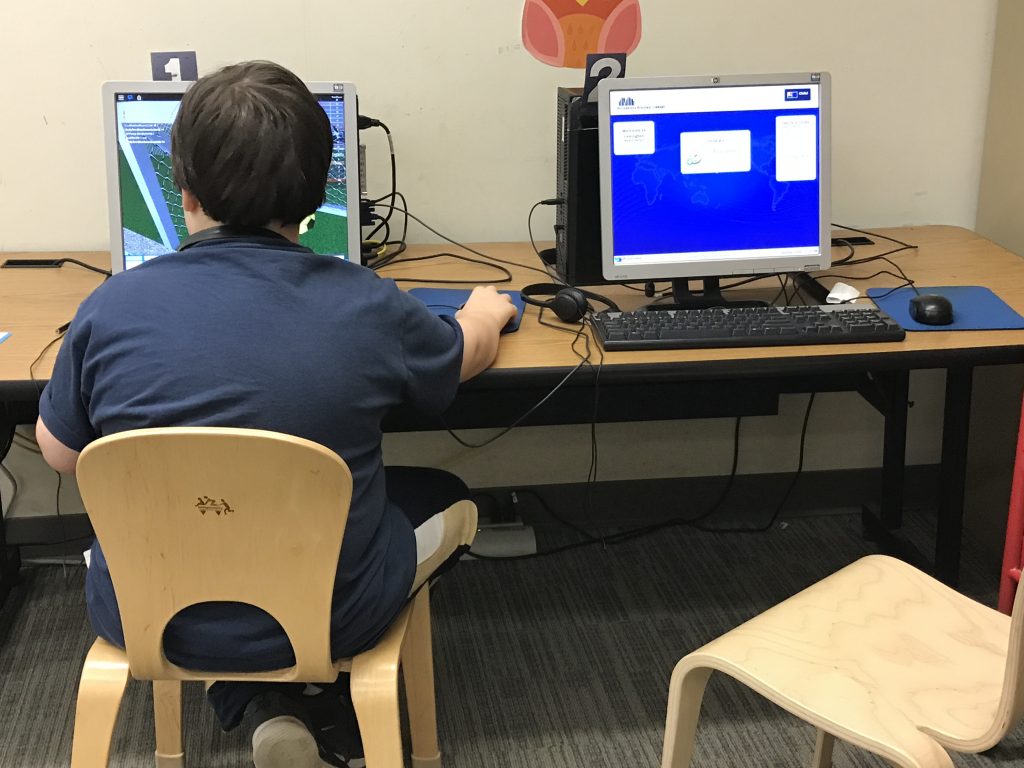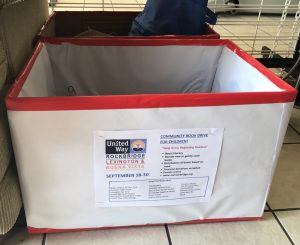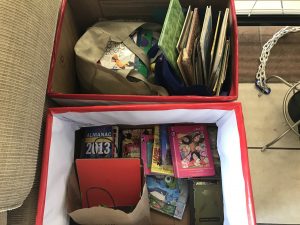
By Alexandra Cline
Sitting in a box in the library on Lexington’s South Main Street is a copy of “It’s Snowing! It’s Snowing!” – a book of poems about snowball fights, ice skating and puffy winter coats.
This book, and others like it, could be in the hands of a child in Rockbridge County as far away as the mountain town of Vesuvius or a farm beyond Collierstown this fall.
In an area that boasts its fair share of two-Ph.D. households around the universities in Lexington, there are pockets in the county where residents’ formal education is as sparse as anywhere in Virginia. Within the wider Rockbridge area, many parents have an educational attainment below the high school level – in fact, one of the lowest rates in the state.
That gap begins to show when local children come to kindergarten: some are already reading books, and some have never held or even seen a book before.
United Way of Rockbridge has been trying to address this educational gap for years with a literacy program called Rockbridge Reads, an initiative that began in 2012. Rockbridge Reads is the organization’s umbrella program for all of its education-based projects. Most of those projects are hosted by education-related organizations that United Way funds through its annual fundraising campaign.
This year, United Way of Rockbridge is kicking off its annual fundraising campaign with an event that also relates to its literacy initiative.

From Sept. 18 to Sept. 30, the organization is hosting a book drive to collect new and gently used books for children in need throughout the area. Local businesses and organizations are serving as the drop-off locations for the books, which will be distributed to United Way’s affiliate agencies.
For Suzanne Gardner, chair of United Way’s public relations committee, the book drive is one way to encourage young children to pick up books at an earlier age.
“Our huge movement is youth literacy,” Gardner said. “Last year, we did a pantry food drive, but this year we wanted to jazz it up and find another way to bring the community together.”
The Rockbridge area by the numbers
The Rockbridge community, says United Way board member Kelly Fujiwara, is one that varies widely by background and demographic.
According to the Virginia Employment Commission, 51 percent of people in Rockbridge County have an educational attainment of high school or less, compared to 37 percent of Virginia. Fujiwara attributed the lower education rates in part to the abundance of industry and factory work in the local area.
“Historically, people have worked in plants in the area, and recently many of them have gone away,” she said. “A lot of children here have parents that didn’t finish school, and grandparents that didn’t finish school.”
In Rockbridge County and Buena Vista, children from poorer households are less likely to perform well on standardized tests. More specifically, children considered to be economically disadvantaged – meaning they are eligible for free or reduced meals, they receive Temporary Assistance for Needy Families, or they are eligible for Medicaid – passed proficiency tests at much lower rates during the 2016-2017 school year.
For Rockbridge, the pass rate for all students in reading and writing was 76 percent and 77 percent, respectively. Among students considered to be economically disadvantaged, the pass rates were nine percent and nineteen percent lower, respectively.
For Buena Vista, the students’ economic status had a similar effect on literacy proficiency. The pass rate for all students in reading and writing was around 74 percent, whereas economically disadvantaged students had a pass rate about nine percent lower.
“We wanted to know how we could lift all of our kids up.”
In recent years, United Way of Rockbridge has begun to address issues such as these by focusing its community outreach primarily on education – particularly early childhood literacy.
That initiative began after United Way Worldwide decided to change its organization’s focus. Instead of serving as a pass-through organization giving funding to other groups, United Way wanted to shift its efforts to direct community involvement by emphasizing three areas – education, income and health.
Since the Rockbridge affiliate is a smaller branch of the broader organization, the local group decided to choose education as its community impact initiative. But, instead of ending fundraising efforts for local agencies, United Way of Rockbridge decided to operate on a hybrid plan.
“Some United Ways stopped funding safety net agencies and went to doing community impact only,” United Way of Rockbridge Executive Director Patte Wood said. “We decided that our agencies needed us in our small area, so we didn’t want to drop that.”
This year, the organization’s fundraising goal is $250,000 – a mark it came very close to reaching last year when it raised $245,000 in direct contributions.
As part of the organization’s hybrid effort, United Way also started Rockbridge Reads in hopes of laying a better foundation for young children when they first start school.
“When kids are in high school and already dropping out, they’re kind of entrenched already,” Fujiwara said. “We like to say that you learn to read through grade three, then after grade three you read to learn. Everybody loves their children, so we wanted to know how we could lift all of our kids up.”
While there are a few preschools, and a head start program in the area, Fujiwara said that many of the area’s poorer children won’t be able to attend since they are half-day programs. Since some parents in the area are juggling two jobs and one car, bringing their children to school before kindergarten often isn’t an option.
Fujiwara also cautioned that while United Way’s programs help bring positive change in the community, the organization itself can’t fix everything – including the county’s educational attainments. Instead, the group measures its impact on education by the success of specific programs at its literacy-based agencies.
Local agencies reach into the community
In this year’s book drive, donated books will be distributed to United Way’s agencies – organizations that receive funding from United Way to serve the local community.

“It’s a neat opportunity to ask folks to clean up a shelf and donate gently used books, and it’s so rewarding knowing how many people will share,” Fujiwara said. “We live in a special, unique community where people are generous.”
At several of United Way’s agencies in the Rockbridge area, children are able to come in and read books as a way to supplement their ongoing education – especially at the Rockbridge Area YMCA and the Rockbridge Regional Library.
The YMCA is one of United Way’s local agencies and will serve as a drop off location for the book drive. Along with United Way, the YMCA has worked to engage children in reading and education from an early age.
According to BreAnne Rogers, YMCA’s program director, the organization has a small library on site and has a child watch area where children eight and under can read and work on arts and crafts with a staff member. Rogers said that the YMCA often shares books with United Way and hosts reading-related events during the year.
“We have a huge array of books for kids,” Rogers said. “We tell them that ‘if you find one you really enjoy, go ahead and take it with you.’”
The accessibility challenge
For the Rockbridge area, Rogers believes that children’s early exposure to books often correlates with a family’s access to transportation or resources. She said that bringing children to places that offer educational activities can be one of the main challenges.
At the Rockbridge Regional Library, Carol Jones, head of youth services, also emphasized the issue of transportation – especially when a library branch isn’t located within a walkable distance from families.
However, instead of dwelling on the problem, Jones said that parents can easily help their children at home by reading to them for fun. She stressed that an advanced education isn’t necessary in order to give children the essential skills they will require later on.
“Some families don’t have books at home, and reading for leisure is not how they spend their time,” Jones said. “It’s really tough if you didn’t grow up in a house where you were read to or played with as a baby, because then you don’t know how to do that. We really want to show parents that they can do this, and it’ll make a difference in the rest of the child’s life.”
